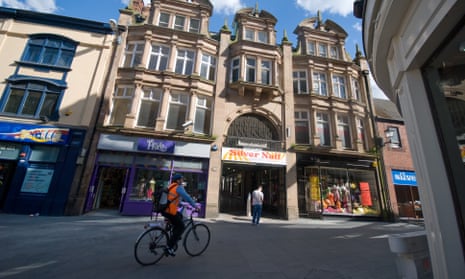Councils across the UK are using radical strategies to cut the number of polluting vehicles on their streets in response to the climate emergency.
Leicester city council hopes a new charge on workplace parking will improve air quality, fund public transport and incentivise walking and cycling.
The power to raise a “workplace parking levy” (WPL) from local businesses was introduced by Labour more than 20 years ago. But parking is such a controversial issue in local government that Nottingham is the only city in the UK with a scheme.
Leicester is now set to become the second: it is consulting on proposals to charge companies with more than 10 parking spaces £550 a year per space from next year. It is up to employers to decide whether to absorb the cost or pass it on to their staff. It could raise £450m in the next decade to invest in a new fleet of electric buses, an expanded cycle network and train station renovations.
Adam Clarke, Leicester’s deputy mayor for environment and transport, wants to use the workplace parking levy more broadly to move away from car dominance.
Clarke said: “We’re a historic city. The road network has been built on a Roman footprint and it suffered from making way for the motor car in the postwar period, which attracted more cars, which has constrained the city.
“We have worked really hard to generate a shift to cycling, walking and the bus. But there needs to be more than a step change, there needs to be a real leap if we’re going to meet our environmental, economic and health challenges.”
The plans have been condemned by some businesses, opposition councillors and motoring organisations. Nigel Porter, a Liberal Democrat councillor in Leicester, said: “The current proposals are just stick, there’s no carrot at all. If you were a nurse or a doctor you could be attending shifts at various times of the day or night – there isn’t always going to be a bus service for you. There appears to be an agenda [among] some members of the Labour party… they want to price people off the road.”
Several local businesses described the WPL as a stealth tax that would “impose a big cost”, according to the council’s economic impact study, while one employer simply described the plan as “insane”.
Clarke said the council wanted to work with employers to come up with specific solutions to gaps in the transport network, including demand-responsive buses and cycle storage.
Others have expressed concern about the impact on low-paid workers. A spokesperson for the AA said: “Given that WPL when passed on to employees is a flat-rate local tax, it hurts lower-income workers more and disproportionately.”

The council said employers may choose to charge higher earners more than low-paid staff if they passed on the fee. Leicester wants to emulate the “15-minute city” model championed by Paris mayor Anne Hidalgo, where all essential amenities can be reached within a 15-minute walk or cycle. It is a relatively compact city and a quarter of all car journeys are less than 1.25 miles, with the average journey 3 miles.
Clarke said: “We know that most journeys in Leicester can be walked or cycled, we know there are huge opportunities to improve the public transport network. If we’re able to do that we’ll be able to provide real alternatives and then those that really need to use a motor car will benefit because there’s less traffic on the road.”
A workplace parking levy is an increasingly attractive idea to local authorities which are short of cash and must meet difficult air quality targets in the next few years. Oxfordshire county council is about to launch a charging zone to cover Oxford city centre, while Cambridge and Bristol have also recently expressed interest.
Workplace parking has become a contentious political issue in Scotland, where Edinburgh and Glasgow are exploring schemes.
Labour and the Conservatives in Scotland have strongly opposed the plans, with Labour transport spokesman Neil Bibby recently branding it a “commuter tax” and a “shameless attack on workers’ pay packets”.
Other councils have used clean air zones – where older, more polluting vehicles are subject to charges – to incentivise sustainable transport. London’s ultra-low emission zone has been running since 2019, and last year Birmingham became the second city to introduce a zone that which applied to private cars.
However plans for a clean air zone in Greater Manchester have stalled, with mayor Andy Burnham demanding more funding from government to help people switch to greener vehicles.
Nottingham’s workplace parking levy has been used to raise £83m directly since 2012, unlocking a further £600m of grants.
It has had a small impact on commuters’ travel patterns, according to one academic evaluation, which found 8.6% of commuters had switched away from the car in part due to the levy.
Sue Flack, who helped deliver Nottingham’s programme and now works as a consultant to local authorities, said: “As far as we can tell there hasn’t been an economic hit to Nottingham and many employers will say they like Nottingham because of its good transport links, although they won’t say they like the WPL.
“They’d prefer to have the transport and not the levy but it doesn’t work like that.”
